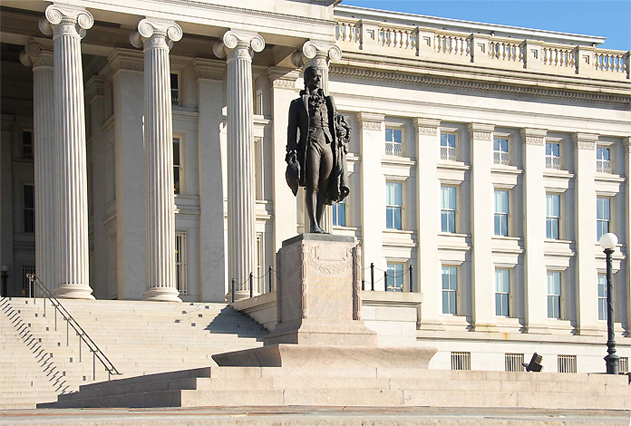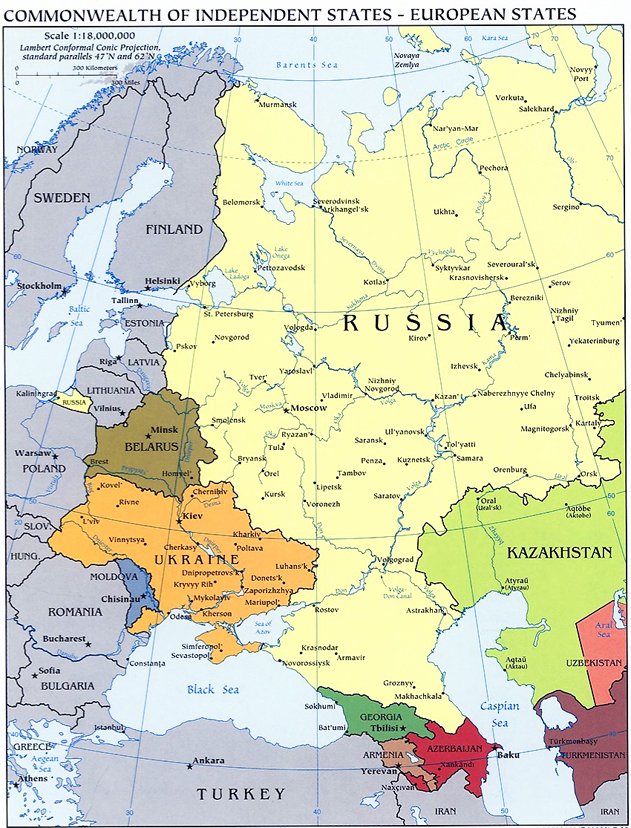U.S. Drip of Sanctions Risks Putin Backlash

(Bloomberg – bloomberg.com – Indira A.R. Lakshmanan, Ilya Arkhipov and Kasia Klimasinska – April 29, 2014) The latest U.S. penalties against Vladimir Putin’s inner circle may provoke the Russian president into escalating the Ukraine crisis without crippling key sectors of his nation’s economy.
The sanctions imposed by the Obama administration yesterday on seven officials and 17 companies won’t go unanswered, with the statement by the White House press secretary “prompting disgust,” Deputy Foreign Minister Sergei Ryabkov said in comments published on the ministry’s website. Russia is preparing retaliatory measures in response to the latest round of sanctions, Federation Council Speaker Valentina Matviyenko said today, according to Interfax.
While markets showed relief as Russia’s largest banks avoided U.S. measures, Putin may take this round personally, according to Konstantin Simonov, president of Russia’s National Energy Security Foundation.
“Putin has been declared evil” and singled out personally by the U.S., Simonov said. “He won’t be able to respond economically, so he’ll retaliate politically. There will be escalation in the east of Ukraine and a new spiral of sanctions.”
Warned by U.S. Secretary of State John Kerry about making an “expensive mistake” in Ukraine, Putin has seen his approval rating at home soar to a six-year high after the seizure of Crimea.
Markets Rally
Russian stocks and bonds climbed for a second day and the ruble advanced after a new round of international sanctions bypassed the country’s major companies and banks.
The dollar-denominated RTS (RTSI$) stock index, which has suffered the world’s worst losses this year as Putin annexed Ukraine’s Crimea peninsula, gained 1.4 percent to 1,155.56 today.
The ruble gained for a second day, strengthening 0.6 percent to 35.59 per U.S . currency. The Russian currency has lost 7.7 percent this year against the dollar, the second-worst performance among 24 emerging-market currencies tracked by Bloomberg after Argentina’s peso.
“These new sanctions don’t represent a full-throated financial campaign to punish Russia, but they do move forward on beginning to isolate additional actors in the Russian economy,” Juan Zarate, senior adviser at the Center for Strategic and International Studies in Washington and a deputy national security adviser under President George W. Bush, said yesterday in an e-mail. “Such measures will have some impact, but they are not likely to impose the types of costs that will change Moscow’s behavior in the short term.”
Gradual Impact
Officials in President Barack Obama’s administration, who briefed reporters in Washington yesterday on condition that they not be named in order to discuss internal deliberations, acknowledged they don’t expect an immediate change i n Putin’s behavior from the new sanctions.
One official said the administration’s goal is to steadily show Russia that there’s going to be severe economic pain and political isolation, and that Russia stands to lose far more over time by continuing its actions in Ukraine.
A second official said that sanctions imposed by the U.S. last month have already had a significant impact on Russia’s economy. The official stressed that the U.S. has additional powerful measures ready for use against individuals and institutions — and potentially entire sectors of the Russian economy, such as banking and energy — and that their deterrent effect shouldn’t be underestimated.
Sechin, Chemezov
The list of officials and companies sanctioned by the U.S. yesterday includes powerful businessmen close to Putin, such as Igor Sechin, OAO Rosneft (ROSN)’s chief executive officer, and Sergei Chemezov, director of State Corporation for Promoting Development, Manufac turing and Export of Russian Technologies High-Tech Industrial Products, also known as Rostec. While the sanctions don’t apply to Rosneft or Rostec, banks such as InvestCapitalBank and SMP Bank are on the list.
The measures are an effort to apply “symbolic pressure” on high-placed officials and probably won’t change Russia’s policies, according to Fyodor Lukyanov, head of the Council on Foreign and Defense Policy in Moscow.
“With the exception of Sechin, this list makes no material difference,” Mattias Westman, who oversees about $3.3 billion in Russian assets as chief executive officer of Prosperity Capital, said by telephone. “I don’t think the West can deal with a blockade of oil and gas and is ready to make the sacrifice for Ukraine.”
‘On Hold’
Even so, Russian energy companies “need capital as well as know-how and expertise” from abroad, Lilit Gevorgyan, senior economist at IHS Global Insight in London, said in an e-mail. Such investme nt “might be on hold at the moment for many foreign companies that otherwise would like to go to Russia,” she said.
The U.S. sanctions are being imposed in conjunction with the European Union, which today added 15 individuals to its list of people subject to travel bans and asset freezes, including Deputy Prime Minister Dmitry Kozak.
Treasury Secretary Jacob J. Lew yesterday defended the Obama administration’s approach, saying in an interview with NBC News/MSNBC that “our goal is to move in a systematic way, in a careful way, in a way that also gives them a chance to change their policy.”
The new U.S. sanctions list also targeted political leaders in Putin’s inner circle, such as Kozak and Vyacheslav Volodin, first deputy chief of the presidential staff.
‘Creative Use’
“The White House is obviously making creative use of sanctions, and doesn’t even know what kind of impact they will have,” said Daveed Gartenstein-Ross, senior fel low at the Foundation for Defense of Democracies in Washington. “Such experimentation is a positive thing, but the various sanctions that the U.S. has imposed are only a small part of a larger set of policies designed to deal with Russia’s incursion into Crimea.”
The U.S. and the EU say Russia hasn’t lived up to an accord signed April 17 in Geneva intended to defuse the crisis.
Obama said yesterday at a news conference in the Philippines that “the goal here is not to go after Mr. Putin, personally.” Instead, he said, “the goal is to change his calculus with respect to how the current actions that he’s engaging in Ukraine could have an adverse impact on the Russian economy over the long haul.”
No Clue
The U.S. move yesterday “demonstrates a complete lack of understanding about what is happening in Ukraine among our colleagues in Washington,” the Russian Foreign Ministry’s Ryabkov said.
The future of Ukraine is hanging in the balan ce, with unrest spreading after an offensive against pro-Russian separatists in the east failed to dislodge militias.
Putin has parliamentary approval to deploy troops in Ukraine to protect Russian speakers and those of Russian heritage. He has about 40,000 troops massed on the border with Ukraine, according to NATO.
Russia’s Defense Ministry said some troops engaged in military exercises near Ukraine’s border had returned to base after the government in Kiev pledged not to use force “against the unarmed population.”
In the latest violence, the mayor of Ukraine’s second-largest city, Kharkiv, was in critical condition after he was shot in the back while riding his bike, the city council said in a statement.
With Russia on the brink of recession, Putin will blame his economic woes on outside pressure, according to Dmitri Trenin, director of the Carnegie Moscow Center.
“The Russian government will now have an excellent reason to ex plain away the coming economic hardships: U.S. sanctions,” he said. “Making Putin back down and concede defeat in Ukraine is improbable. Driving wedges between the Russian leader and his close associates is equally hopeless.”
Article ©2014 Bloomberg L.P. All Rights Reserved. Article also appeared at http://www.bloomberg.com/news/2014-04-29/u-s-drip-feed-of-sanctions-seen-risking-putin-backlash.html

